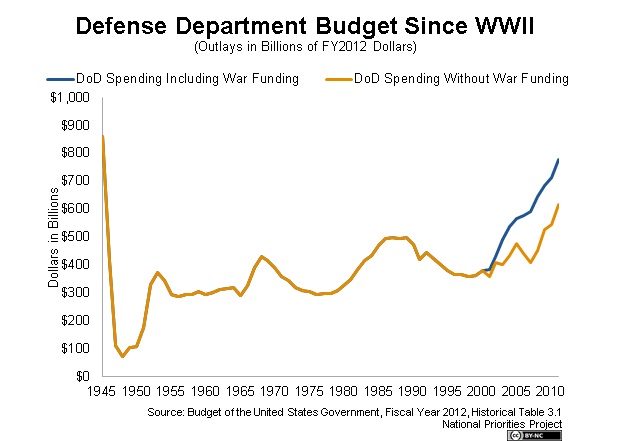U.S. Defense Department budget since WW2
Food for thought from the National Priorities Project:
As the chart below shows, current defense spending levels – even without funding for the wars in Iraq and Afghanistan – are higher than at any time since World War II when adjusted for inflation.

We’re Not Broke
Watch the trailer for the new film, We’re Not Broke
“…the story of U.S. corporations dodging billions of dollars in income tax, and how seven fed-up Americans take their frustration to the streets…and vow to make the corporations pay their fair share.” – from werenotbrokemovie.com
Robert F. Kennedy versus GDP
Hear Robert F. Kennedy’s words, just as compelling today as when they were spoken shortly before his assassination in 1968:
Source: http://www.youtube.com/watch?v=77IdKFqXbUY
Econ4: Changing the Way We Look at Economics
Fast Company (fastcoexist.com) reports on Econ4:
“We’re economists: we want to promote not only the supply of new economics teaching but also student demand for it.”
Read the story and accompanying interview here.
Unequal and unstable
The correlation between income inequality and financial crises raises an important question: could it be that extended periods of increased income inequality help to cause financial crises? Evidence suggests this may well be the case, through three primary mechanisms that reinforce each other:
- Sharp increases in debt-to-income ratios among lower- and middle-income households looking to maintain consumption levels as they fall behind in terms of income;
- The creation of large pools of idle wealth, which increase the demand for investment assets, fuel financial innovation, and increase the size of the financial sector;
- And disproportionate political power for elite financial interests which often yields policies that negatively affect the stability of the financial system.
Read their analysis here.
RFK on the poverty of satisfaction
Ronald writes on January 6, 2012, quoting from an address by Robert F. Kennedy at the University of Kansas:
“Even if we act to erase material poverty, there is another great task. It is to confront the poverty of satisfaction a lack of purpose and dignity that inflicts us all.
“Too much and for too long, we seem to have surrendered community excellence and community values in the mere accumulation of material things.
“The gross national product does not allow for the health of our children, the quality of their education, or the joy of their play.
“It does not include the beauty of our poetry or the strength of our marriages; the intelligence of our public debate or the integrity of our public officials.
“It measures neither our wit nor our courage; neither our wisdom nor our learning; neither our compassion nor our devotion to our country;
“It measures everything, in short, except that which makes life worthwhile.”
I have always found this text very inspirational.
I wish you the best of luck !
Econ4 replies:
Thanks, Ronald. There’s still a tremendous gap between how orthodox economists measure well-being and what’s really of value. In these eloquent remarks, delivered just 11 weeks before he was assassinated, RFK pinpointed one of the reasons why we want to upload ethics into economics.
Measure what matters
From Matthew, December 10, 2011:
As a macroeconomic indicator of well-being, GDP is lousy. We need to measure what matters.
Econ4 replies:
You’re absolutely right. We’re currently drafting the script for an Econ4 video on “Measuring the Economy” – and looking for funding to produce it.
Economic fallacies: time to work more, or less?
In the models of neo-classical economics times like the present are assumed away. But when we’re actually living through them, we need to recognise that measures that result in higher hours can be counter-productive by creating more unemployment and investor pessimism. Similarly, responding to shortfalls in pension programs by asking people to stay in the labour force more years further dis-equilibrates the market by creating more demand for a limited number of jobs.
Ethics in economics: a step forward
The Wall Street Journal, reporting on the American Economics Association’s recent decision to require economists to disclose potential conflicts of interest, quotes Econ4’s George DeMartino and Gerald Epstein, leading advocates of uploading ethics into the profession.
George DeMartino, a University of Denver professor who headed the panel, has argued for the adoption of an even broader “economists’ oath” that would address questions like the ethics of advising dictators and the responsibility of economists to stand up for the poor.
Gerald Epstein, a professor at the University of Massachusetts at Amherst who has previously criticized economists’ lack of disclosure, in an email called the policy “a very big step forward.” He said the call for disclosure in nonacademic work, though nonbinding was particularly important because it will help “set norms of behavior that colleagues, the press, students and citizens can help hold economists accountable to.”
Read the story here.
Tent City University
The U.K.’s “Tent City University” offers a short course in occupied economics:






